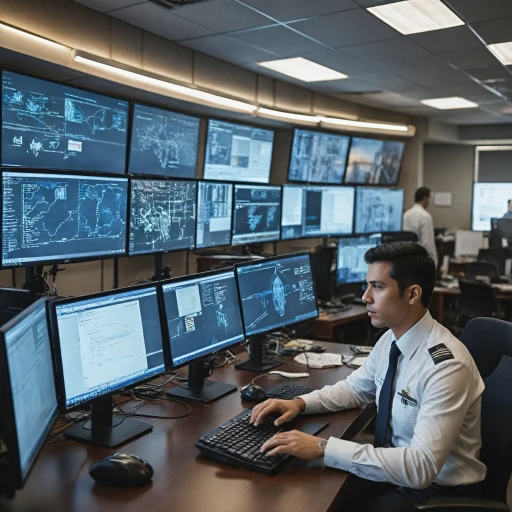
Understanding the Role of Executive Coaching
The Essence of Executive Coaching in Today's Business Landscape
Embracing executive coaching has become increasingly vital for senior executives aiming to foster growth and adaptability in today's fast-paced business environment. While Paris stands as a hub for innovation and leadership development, the role of executive coaching extends far beyond geographical boundaries, impacting leadership, team dynamics, and overall company performance. Foremost, executive coaching provides leaders with tailored strategies and practical tools to navigate complex business challenges. With well-structured programs, these sessions focus on enhancing core competencies such as decision-making and leadership resilience. Such personalized guidance not only supports the professional growth of individual executives but also contributes to the collective effectiveness of executive committees and teams. Moreover, coaching boosts the potential of leaders by focusing on their unique strengths and developmental needs. The coaching experience often involves identifying areas for growth, thereby enabling executives to fully realize their potential and lead their organizations toward sustained success. For companies seeking a competitive edge in Paris's dynamic business ecosystem, executive coaching offers a strategic advantage. By aligning leadership development efforts with the organization's goals, coaching helps create a culture of continuous improvement and adaptability, essential for long-term success. For those eager to delve deeper into strategic executive approaches in France, navigating strategy consulting boutiques offers further insights into leveraging external partnerships for business growth and transformation.Navigating Complex Business Challenges
Addressing Organizational and Market Dynamics
In the ever-evolving business landscape, executives face multifaceted challenges that require innovative solutions. Effective executive coaching programs focus on equipping leaders with the skills to deftly navigate these complexities. From strategic market shifts to internal organizational changes, leaders must remain agile and responsive. Maximizing leadership potential with an executive coach can significantly bolster a leader's capacity to manage these dynamics.
Paris, a hub of international business, presents unique challenges and opportunities for executives. Many companies in this vibrant city are turning to coaching as a strategic tool to foster strong leadership development. Through targeted approaches, executive coaches help leaders enhance their strategic thinking and adaptive management skills.
Complex business challenges often transcend individual leadership and extend to teams. Team coaching sessions are therefore integral to developing a unified vision. These sessions create an environment where diverse perspectives are harnessed, fostering innovative solutions derived from collective insights.
The involvement of executive coaches provides a fresh lens through which leaders can examine both immediate issues and long-term strategic goals. The personalized support and feedback from experienced coaches can illuminate blind spots that may hinder progress and innovation. Over the years, the impact of this guidance has proven essential for successful leadership in demanding markets.
Ultimately, the goal is not just to react to challenges but also to preemptively identify potential hurdles. Customized coaching interventions prepare leaders to anticipate changes and lead confidently, maintaining a company's competitive edge in an unpredictable business environment.
Building Resilient Leadership
Empowering Leadership to Endure Challenges
In the dynamic business ecosystem of Paris, building resilient leadership is a critical focus for executives striving for sustained growth. By leveraging executive coaching, leaders can strengthen their capabilities to withstand the pressures of complex business environments. With the guidance of an experienced coach, executives gain insights into their personal leadership style, which can be a transformative experience. The emphasis of development programs within executive coaching is on enhancing both individual and collective leadership potential. Through personalized coaching sessions, leaders are encouraged to explore their strengths and address areas needing improvement, fostering a robust leadership framework ready to tackle long-term business challenges. Furthermore, participation in workshops and training sessions provides senior executives with practical tools and strategies that can be readily implemented in their management roles. Incorporating coaching into the daily routines of leaders not only builds personal resilience but also extends to the entire organization. As leaders become more adept at navigating challenges, they serve as pillars of support for their teams, fostering an environment of resilience and adaptability. This cultural shift enables the company to thrive amidst uncertainties and positions it for future growth. For c-suite executives aiming to bolster their leadership capabilities in Paris, understanding the intricate dynamics of team coaching and executive development is crucial. This not only enhances their individual work but also significantly benefits their company’s overall performance. A leading company secretary can further streamline these efforts, promoting efficiency and better management outcomes.Enhancing Decision-Making Skills
Refining the Art of Decision-Making
In today's fast-paced business environment, senior executives must possess sharp decision-making skills to steer their organizations towards success. Whether navigating complex business challenges or fostering a culture of continuous improvement, decision-making remains a cornerstone of effective leadership. Executive coaching programs in Paris are designed to provide leaders with the tools and frameworks needed to elevate their decision-making capabilities. By collaborating with seasoned executive coaches, leaders gain insights into strategic thinking and judgment, enabling them to evaluate situations from multiple perspectives and make well-informed choices. ### Key Benefits of Decision-Making Development- Enhanced Perspective: Coaching sessions help leaders expand their viewpoints, considering both immediate and long-term impacts of decisions.
- Risk Management: Through business coaching, leaders learn to assess potential risks and develop strategies to mitigate them effectively.
- Collaborative Choices: Team coaching emphasizes the importance of involving management teams in decision processes, fostering a culture of shared responsibility.
Fostering a Culture of Continuous Improvement
Creating a Culture of Lifelong Learning
In the dynamic realm of executive leadership, fostering a culture of continuous improvement is crucial, both at the individual and organizational levels. Senior executives must prioritize developing programs and initiatives that not only support their team but also encourage a shared vision for growth and development. Empowering the leadership team with high-impact coaching practices can ignite this culture. By integrating team coaching and individualized training, executives can establish a learning environment where leaders are motivated to elevate their skills consistently. It is not just about managing change but rather inspiring it through tailored executive coaching programs in Paris. Key elements to build this culture include:- Workshops and Training Sessions: Organize regular workshops and training for both individual and collective team development. These sessions provide professional environments where leaders can engage, share insights, and develop vital skills.
- Reflective Practices: Encourage leaders to engage in reflective practices facilitated by experienced executive coaches. Encouraging introspection can often lead to innovative solutions and improved business strategies.
- Mentorship and Peer Support: Establish mentorship programs and peer discussions to reinforce collaborative learning. These platforms offer executives the opportunity to learn from others' experiences while contributing to organizational evolution.
Measuring the Impact of Coaching on Business Outcomes
Evaluating the Effectiveness of Executive Coaching
In the dynamic business environment of Paris, where leaders are constantly navigating complex challenges, the impact of executive coaching on business outcomes cannot be overstated. Measuring this impact requires a strategic approach that aligns with the goals of the organization and the individual development of executives.
To effectively evaluate the success of coaching programs, consider the following key areas:
- Goal Alignment: Establish clear, measurable objectives at the outset of the coaching engagement. These should align with both the company’s strategic goals and the personal development goals of the executives involved.
- Feedback Mechanisms: Implement regular feedback loops involving the executive, their coach, and relevant stakeholders. This ensures that the coaching process remains aligned with the evolving needs of the business and the individual.
- Performance Metrics: Utilize both qualitative and quantitative metrics to assess improvements in leadership capabilities, decision-making skills, and team dynamics. This might include surveys, performance reviews, and business performance indicators.
- Long-Term Impact: Consider the long-term effects of coaching on leadership development and business outcomes. This includes tracking the sustained growth of executives and their teams over time, beyond the immediate coaching sessions.
By focusing on these areas, companies can ensure that their investment in executive coaching translates into tangible business results. The ultimate goal is to foster a culture of continuous improvement and resilient leadership that drives the organization forward.














